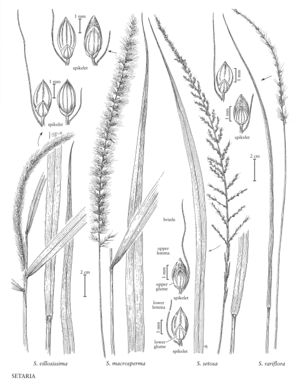Difference between revisions of "Setaria setosa"
FNA>Volume Importer |
imported>Volume Importer |
||
| (5 intermediate revisions by 2 users not shown) | |||
| Line 4: | Line 4: | ||
|publications= | |publications= | ||
|common_names=West indies bristlegrass | |common_names=West indies bristlegrass | ||
| + | |special_status={{Treatment/ID/Special_status | ||
| + | |code=I | ||
| + | |label=Introduced | ||
| + | }} | ||
|basionyms= | |basionyms= | ||
|synonyms= | |synonyms= | ||
| Line 26: | Line 30: | ||
-->{{#Taxon: | -->{{#Taxon: | ||
name=Setaria setosa | name=Setaria setosa | ||
| − | |||
|authority=(Sw.) P. Beauv. | |authority=(Sw.) P. Beauv. | ||
|rank=species | |rank=species | ||
| Line 33: | Line 36: | ||
|basionyms= | |basionyms= | ||
|family=Poaceae | |family=Poaceae | ||
| + | |illustrator=Linda A. Vorobik;Annaliese Miller | ||
| + | |illustration copyright=Utah State University | ||
|distribution=Puerto Rico;N.J.;Virgin Islands;Ala.;Fla. | |distribution=Puerto Rico;N.J.;Virgin Islands;Ala.;Fla. | ||
|reference=None | |reference=None | ||
|publication title= | |publication title= | ||
|publication year= | |publication year= | ||
| − | |special status= | + | |special status=Introduced |
| − | |source xml=https:// | + | |source xml=https://bitbucket.org/aafc-mbb/fna-data-curation/src/200273ad09963decb8fc72550212de541d86569d/coarse_grained_fna_xml/V25/V25_1408.xml |
|subfamily=Poaceae subfam. Panicoideae | |subfamily=Poaceae subfam. Panicoideae | ||
|tribe=Poaceae tribe Paniceae | |tribe=Poaceae tribe Paniceae | ||
Latest revision as of 17:56, 11 May 2021
Plants perennial. Culms 50-100 cm; nodes usually glabrous. Sheaths glabrous or finely pubescent, margins ciliate distally; ligules of 1 mm hairs; blades 15-20 cm long, 6-12 mm wide, flat or folded, often finely pubescent on both surfaces. Panicles 15-20 cm, loosely spikelike, interrupted, attenuate; rachises often villous; branches ascending, lower branches about 2.5 cm; bristles usually solitary, less than 10 mm, antrorsely scabrous. Spikelets 2-2.5 mm, ovate-lanceolate. Lower glumes about 1/2 as long as the spikelets, 3-veined; upper glumes about 2/3 as long as the spikelets, 5-7-veined; lower lemmas equaling the upper lemmas; lower paleas as long as the upper paleas, broad; upper lemmas finely and distinctly transversely rugose. 2n = unknown.
Distribution
Puerto Rico, N.J., Virgin Islands, Ala., Fla.
Discussion
Setaria setosa is native to the West Indies and Mexico. It is probably a recent introduction to Florida, but appears to be established there. The specimen from New Jersey was from a ballast dump; the species is not established in that state.
Selected References
None.
